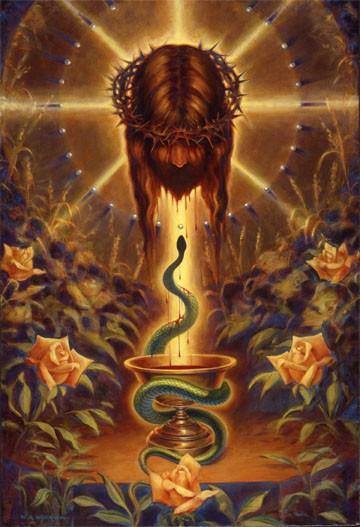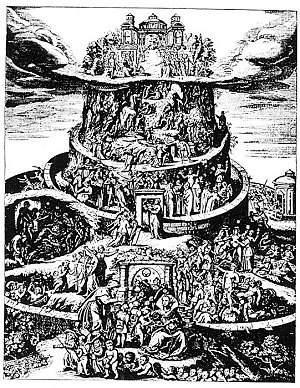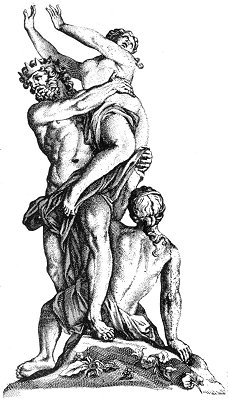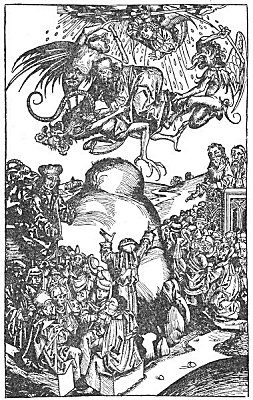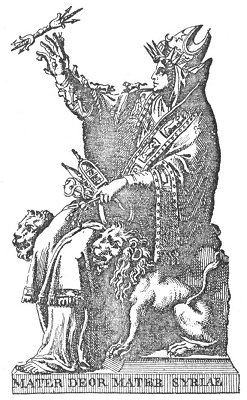Page 238
general resurrection, when the good will immediately enter into this happy abode — the regenerated earth; and Ahriman and his angels (the devils), and the wicked, be purified by immersion in a lake of molten metal. . . . Henceforward, all will enjoy unchangeable happiness, and, headed by Sosiosh, ever sing the praises of the Eternal One.” The above is a perfect repetition of Vishnu in his tenth avatar, for he will then throw the wicked into the infernal abodes in which, after purifying themselves, they will be pardoned — even those devils which rebelled against Brahma, and were hurled into the bottomless pit by Siva, as also the “blessed ones” will go to dwell with the gods, over the Mount Meru.
Having thus traced the similarity of views respecting the Logos, Metatron, and Mediator, as found in the Kabala and the Codex of the Christian Nazarenes and Gnostics, the reader is prepared to appreciate the audacity of the Patristic scheme to reduce a purely metaphysical figure into concrete form, and make it appear as if the finger of prophecy had from time immemorial been pointing down the vista of ages to Jesus as the coming Messiah. A theomythos intended to symbolize the coming day, near the close of the great cycle, when the “glad tidings” from heaven should proclaim the universal brotherhood and common faith of humanity, the day of regeneration — was violently distorted into an accomplished fact.
“Why callest thou me good? there is none good but one, that is God,” says Jesus. Is this the language of a God? of the second person in the Trinity, who is identical with the First? And if this Messiah, or Holy Ghost of the Gnostic and Pagan Trinities, had come in his person, what did he mean by distinguishing between himself the “Son of man,” and the Holy Ghost? “And whosoever shall speak a word against the Son of man, it shall be forgiven him; but unto him that blasphemeth against the Holy Ghost, it shall not be forgiven,” he says. And how account for the marvellous identity of this very language, with the precepts enunciated, centuries before, by the Kabalists and the “Pagan” initiates? The following are a few instances out of many.
“No one of the gods, no man or Lord, can be good, but only God alone,” says Hermes.
Page 239
“To be a good man is impossible, God alone possesses this privilege,” repeats Plato, with a slight variation.
Six centuries before Christ, the Chinese philosopher Confucius said that his doctrine was simple and easy to comprehend (Lun-yu, chap. 5, § 15). To which one of his disciples added: “The doctrine of our Master consists in having an invariable correctness of heart, and in doing toward others as we would that they should do to us.”
“Jesus of Nazareth, a man approved of God among you by miracles,” exclaims Peter, long after the scene of Calvary. “There was a man sent from God, whose name was John,” says the fourth Gospel, thus placing the Baptist on an equality with Jesus. John the Baptist, in one of the most solemn acts of his life, that of baptizing Christ, thinks not that he is going to baptize a God, but uses the word man. “This is he of whom I said, after me cometh a man.” Speaking of himself, Jesus says, “You seek to kill me, a man that hath told you the truth, which I have heard of God Even the blind man of Jerusalem, healed by the great thaumaturgist, full of gratitude and admiration for his benefactor, in narrating the miracle does not call Jesus God, but simply says, “. . . a man that is called Jesus, made clay.”
We do not close the list for lack of other instances and proofs, but simply because what we now say has been repeated and demonstrated by others, many times before us. But there is no more incurable evil than blind and unreasoning fanaticism. Few are the men who, like Dr. Priestley, have the courage to write, “We find nothing like divinity ascribed to Christ before Justin Martyr (A. D. 141), who, from being a philosopher, became a Christian.”

Moe is the founder of GnosticWarrior.com. He is a father, husband, author, martial arts black belt, and an expert in Gnosticism, the occult, and esotericism.

